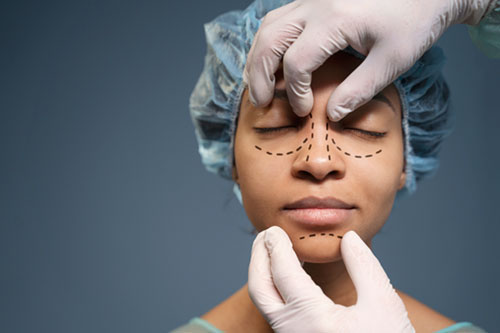Plastic Surgery Rancho Cucamonga: Improve Your Confidence with Customized Aesthetic Treatments
Plastic Surgery Rancho Cucamonga: Improve Your Confidence with Customized Aesthetic Treatments
Blog Article
Examining the Mental and Social Aspects That Drive People to Think About Plastic Surgery as a way of Renovation
The decision to seek cosmetic surgery commonly prolongs past mere aesthetic appeals, intertwining with social and mental characteristics that merit detailed evaluation. Variables such as self-worth, pervasive societal elegance standards, and the pervasive influence of social networks converge to shape individual motivations for surgical improvement. As these impacts become progressively prominent, comprehending the underlying psychological and cultural contexts is vital. What continues to be to be checked out is the profound influence these elements have not just on individuality however also on broader social standards and values surrounding appeal and acceptance.
The Duty of Self-confidence
Self-confidence dramatically influences a person's choice to go after plastic surgery. People with reduced self-esteem typically regard themselves in an unfavorable light, resulting in feelings of inadequacy concerning their physical appearance. This negative self-perception can drive them to seek surgical treatments as a technique of enhancing their self-image. The need for improvement in one's look is regularly connected to an idea that such changes will certainly elevate their total self-regard and self-confidence.

Inevitably, the role of self-esteem in the decision-making procedure concerning cosmetic surgery highlights the complex interaction in between body picture, personal contentment, and psychological health. Comprehending this partnership is critical for healthcare professionals to guarantee that people are making notified decisions rooted in sensible assumptions and emotional health.
Social Beauty Standards
Influenced by pervasive media representations and social narratives, social elegance requirements play a vital duty fit people' perceptions of their own bodies. These standards are commonly defined by an idealized type of elegance that highlights attributes such as youthfulness, balance, and slimness. As these perfects are bolstered through various networks, including tv, advertising, and film, individuals often internalize these messages, resulting in dissatisfaction with their all-natural look.
The implications of these societal norms prolong past visual preferences; they can impact self-confidence, psychological health, and social partnerships. Individuals who perceive themselves as dropping short of these requirements may experience feelings of inadequacy, motivating a desire for cosmetic surgery as a way of achieving social approval. This quest is commonly sustained by the belief that satisfying these ideals will boost not only physical look yet additionally social standing and personal gratification.

Impact of Social Media
The impact of social appeal standards is additional intensified by the rise of social media platforms, where curated images and idyllic depictions of charm are common. Customers are continuously subjected to filtered and modified photographs, which frequently portray unattainable physical features. This direct exposure cultivates a culture of comparison, leading individuals to examine their very own appearance versus these typically unrealistic benchmarks.
Social media influencers and celebs regularly advertise aesthetic procedures, stabilizing the concept that medical improvements are a practical means for attaining societal suitables (plastic surgery rancho cucamonga). The visibility of these improvements can develop an assumption that going through cosmetic surgical treatment is a conventional technique, thus influencing individuals to consider similar treatments as a pathway to improved self-worth and social acceptance
Furthermore, the interactive nature of social networks permits instant comments via likes and comments, even more enhancing the desire to satisfy preferred beauty requirements. Such communications can exacerbate feelings of inadequacy and drive individuals toward cosmetic surgery as a way of obtaining validation. Eventually, social networks plays a crucial duty fit understandings of appeal, which significantly impacts the decision-making procedures bordering plastic surgery.

Social Point Of Views on Appearance
Across various cultures, assumptions of appearance are deeply rooted in historical, social, and financial contexts, forming individuals' views on elegance and desirability. In several societies, look acts as a considerable pen of identification, affecting social status, professional possibilities, and personal partnerships. As an example, in some cultures, light skin is commonly related to wide range and advantage, while others may idealize darker complexion as signs of strength and credibility.
Furthermore, typical elegance requirements are often continued with social stories, media this article representations, and family affects, bring about differing perfects throughout various regions (plastic surgery rancho cucamonga). In Western societies, the focus on youth and physical conditioning often drives people toward cosmetic improvement, while in specific Eastern societies, even more subtle modifications aligned with conventional visual appeals might be chosen
Globalization and the expansion of electronic media have even more complicated these dynamics, creating a hybridization of appeal ideals that goes beyond geographical limits. As individuals progressively navigate these cultural narratives, the pressure to satisfy specific look standards can bring about the desire for plastic surgery, reflecting a complex interplay of personal ambitions and social worths. Understanding these social point of views is important in dealing with the inspirations behind cosmetic surgical procedure factors to consider.
Mental Effects of Aesthetic Surgery
Several people looking for plastic surgery report experiencing extensive mental influences that can dramatically change their self-perception and psychological well-being - plastic surgery rancho cucamonga. The desire for physical improvement usually stems from underlying problems such as low self-esteem, body dysmorphic problem, or societal stress regarding appeal criteria. For some, the immediate post-operative stage can bring about a temporary increase in self-esteem and fulfillment with their look, fostering a feeling of empowerment
However, these favorable sensations might not be sustaining. Research suggests that while some people experience enhanced self-worth, others may deal with intense anxiousness or depression if their expectations are not met. This inconsistency can occur from unrealistic ideals bolstered by media depiction and cultural narratives bordering charm.
Furthermore, the emotional implications of plastic surgery prolong beyond the individual. Relationships with household and pals might be stressed as social dynamics change, resulting in sensations of seclusion or alienation. Eventually, the emotional effects of cosmetic surgery are intricate and diverse, requiring careful factor to consider by both prospective patients and health care providers to make sure enlightened decision-making and sensible expectations.
Conclusion
In conclusion, the decision to go after cosmetic surgical procedure is dramatically influenced by a mix of self-worth concerns, societal elegance requirements, and social point of views on appearance. The useful site pervasive reach of social networks better intensifies these pressures, promoting impractical perfects that individuals commonly strive to acquire. Understanding these psychological and social factors is important for addressing the motivations behind cosmetic surgical treatment, highlighting the demand for a more nuanced conversation surrounding elegance and self-acceptance in modern culture.
The decision to go after cosmetic surgical treatment typically extends beyond simple aesthetics, linking with emotional This Site and social characteristics that warrant complete examination. Eventually, social media plays a pivotal role in shaping perceptions of beauty, which substantially influences the decision-making processes bordering cosmetic surgery.
As people progressively browse these cultural narratives, the stress to adhere to particular appearance standards can lead to the wish for cosmetic surgical procedure, showing an intricate interplay of cultural worths and personal desires.In verdict, the decision to pursue cosmetic surgery is dramatically influenced by a mix of self-worth problems, societal charm requirements, and social perspectives on look. Understanding these mental and social factors is vital for resolving the motivations behind cosmetic surgical treatment, highlighting the need for a much more nuanced discussion surrounding elegance and self-acceptance in modern culture.
Report this page